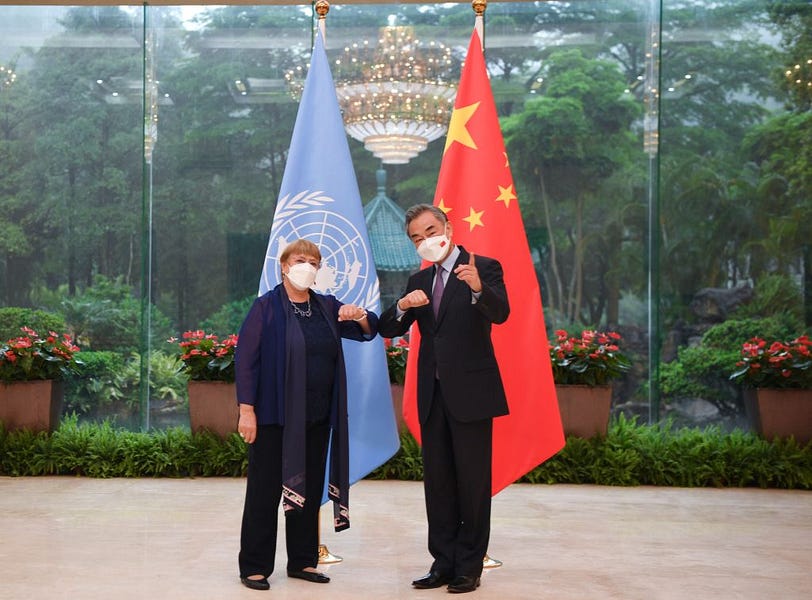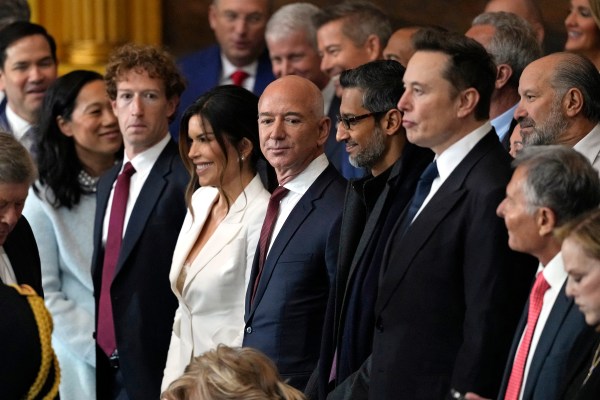The United Nations High Commissioner for Human Rights Michelle Bachelet’s recently concluded visit to Xinjiang was a disgrace for Bachelet personally and an institutional failure for the United Nations. It was also a stark reminder of China’s determination to advance its own set of norms at the expense of universal ones of democracy and human rights.
Ahead of her six-day visit to China, during which she spent two days in Xinjiang, Bachelet was advised by human rights advocates, parliamentarians and senior U.S. officials that the trip promised to award the Chinese Communist Party a propaganda victory. A letter sponsored by the Inter-Parliamentary Group on China warned that the visit risked violating the U.N.’s own standards for such visits, which call for freedom of movement and unsupervised, confidential meetings with witnesses. It would, they worried, amount to a “Potemkin style tour.”
In fact, Bachelet, a former president of Chile and a torture victim of the Pinochet dictatorship, didn’t need to set foot inside Xinjiang to know about the scale of repression, the detention camps that have held up to 1 million Uyghurs, procurement tenders for their construction and hiring of guards, policies, and procedures for interrogation and indoctrination of inmates and the humiliating, degrading treatment up to and including torture and rape. Shattering testimonies by Uyghurs who have escaped paint a devastating picture of persecution, suffering, and religious and cultural annihilation.
Moreover, Bachelet set off on her mission just as a consortium of news outlets published a trove of leaked Xinjiang police files. The documents, including thousands of photographs, added to an already extensive record of repression of the Uyghurs, Kazakhs, and other Muslims in China’s northwest. From the police files, analysts noted in particular a direct link between the atrocities and Xi Jinping, the Communist Party general secretary; direction from the leadership is a vital element in the definition of genocide, which the U.S. has applied to China’s treatment of the Uyghurs.
Bachelet’s end-of-trip press conference only compounded the image of a visit manipulated by China. From Guangzhou, sitting in front of a stylized Chinese watercolor backdrop, she parroted the Communist Party’s propaganda, praising its poverty alleviation while pulling punches on its extreme abuses of individual rights. Asked whether she pressed officials on the cases of individual Uyghurs, saying she could not share details lest it hurt the individuals concerned, although the trap of “quiet diplomacy” has rarely led to concessions.
According to Daniel Tobin, of the National Intelligence University, “the Party’s efforts to redefine human rights away from political rights to ‘“the right to develop’” (material well-being rather than political expression)” is just one example of a broader party agenda about which there should no longer be any doubt. For decades it was supposed that the Party’s only objective was to stay in power, but in fact, “rather than reactive, defensive, and besieged, the Party’s pursuit of modernity, power, and international status for China has been strategic, active, and purposeful.”
Although Hong Kong was not on her itinerary, Bachelet urged the “government there” to “do all it can to nurture—and not stifle”—human rights, a comment completely at odds with reality. China has just overseen the installation of John Lee, the chief enforcer of the national security law crackdown, as the city’s new chief executive. Many of its pro-democracy politicians, as well as journalists, lawyers, and Catholic Cardinal Joseph Zen have been arrested. They will be demoralized by Bachelet’s comments.
Batting away criticism, Bachelet said her visit was never intended to be an investigation, only a chance to engage in dialogue with Chinese leaders. For his part, Chinese leader Xi Jinping’s ambitions for the Bachelet mission were much more ambitious. After circumscribing where she went and whom she met, Xi used their video meeting to deliver the panoply of CCP propaganda points, including: that there is no one standard for human rights; that China’s reduction of poverty substitutes for individual political rights; that international diplomacy on is merely a tool to “apply double standards” or “a pretext to interfere” in China’s internal affairs; and that China’s “democracy” and “human rights” are “guaranteed like never before.”
The Bachelet mission was a throwback to an earlier era, which, bafflingly persists at the U.N., where China has amassed significant influence, running important agencies and imposing litmus tests on how issues including human rights, Tibet, and Taiwan, are addressed.
Bachelet’s term ends this year. She should not be reappointed. Her disastrous mission has real human costs and should spur the democracies to take the ideological competition with China more seriously enough to win it.
Ellen Bork writes about American foreign policy with a focus on democracy and human rights.






Please note that we at The Dispatch hold ourselves, our work, and our commenters to a higher standard than other places on the internet. We welcome comments that foster genuine debate or discussion—including comments critical of us or our work—but responses that include ad hominem attacks on fellow Dispatch members or are intended to stoke fear and anger may be moderated.
With your membership, you only have the ability to comment on The Morning Dispatch articles. Consider upgrading to join the conversation everywhere.